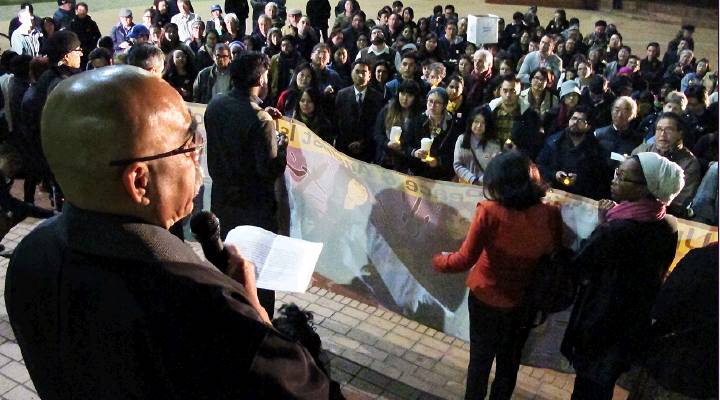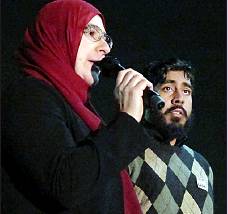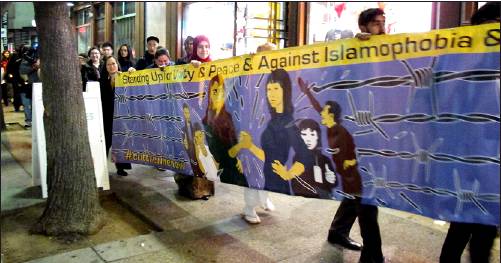Little Tokyo Vigil Expresses Solidarity
By J.K. YAMAMOTO
RAFU STAFF WRITER
Japanese American community groups held a vigil on Dec. 7 in Little Tokyo to express solidarity with Muslim Americans, immigrants and others concerned about how they will be treated by the incoming Trump Administration.
More than 200 people attended the event in the plaza of the Japanese American Cultural and Community Center, sponsored by Nikkei for Civil Rights & Redress (NCRR), the Nikkei Progressives and the Vigilant Love Coalition.
Co-emcee Tanzila Ahmed of 18 Million Rising noted that a similar vigil was held a year ago in the wake of anti-Muslim sentiment following terrorist attacks in Paris and San Bernardino. “Since then there has been an increase in attacks against the Muslim community, against immigrant communities, against people of color … incited by the political rhetoric out there … It’s bittersweet that we have to come here again now, and we need to work harder than ever to mobilize.”
Co-emcee Sean Miura of Tuesday Night Café explained that the 75th anniversary of the Pearl Harbor attack was chosen for the date of the vigil because for Japanese Americans it marked the beginning of their wartime incarceration. “Almost 2,000 Issei … were rounded up by the FBI [the day after Pearl Harbor] and taken away first to temporary facilities … like Tuna Canyon in Tujunga and Griffith Park, and eventually faraway places like Missoula, Montana and Bismarck, North Dakota …
“It’s really clear that the U.S. government knew exactly who they were coming for … knew the names of people who they wanted to round up … leaders in the community, folks who ran language schools, folks who ran community centers, religious leaders.”
Rinban William Briones of Nishi Hongwanji noted that Buddhist priests were among the first group arrested and held in Department of Justice camps, accused of “culturally subversive activities.” He pointed out that the eventual roundup of all Japanese Americans on the West Coast in 1942 was not just a result of Pearl Harbor. “It was the culmination of a history of racial discrimination against Asians that began in the mid-1800s when the Chinese first immigrated to the U.S.,” he said, adding that Japanese were denied the right to become naturalized citizens, to own land, or to marry outside their race, and in 1924 immigration from Japan was halted altogether.
Asians, like Muslims today, have been viewed as separate from mainstream society because of “racial assumptions,” Briones said, calling for unity between the two communities.
Jim Matsuoka, 80, who was incarcerated at Manzanar as a child, recalled dreading Pearl Harbor Day when he was growing up because people “made me feel like I was part of this sneak attack.”
He described last Nov. 8 as “another day of infamy” because of the election results. “All the ideals of America were scorned in their haste to make America great again, or was it make America white again? … We believe in the American ideals. We fought for and struggled to honor these beautiful ideals, ideals that make our country great … They trampled on all that was dear to you and me. It makes me wonder about all who sacrificed, who gave their all for this country …
“I won’t let them define me anymore. I am a first-class citizen whether they like it or not. If they don’t like it, they can kiss my yellow … Brothers and sisters, let us not hang our heads in defeat … Let us hoist the standard, let us unite for fairness for all of us … No to racism, no to sexism, no to homophobia, no to the wall, no to registration for Muslim Americans, and most of all no to Donald Trump.”
Kristin Fukushima of Nikkei Progressives said, “We take inspiration from the courage and resilience of the Issei and Nisei who suffered the greatest losses during World War II and survived to rebuild the community. We take inspiration from the progressive history of our community — from the people who challenged the evacuation, like Mitsuye Endo, Gordon Hirabayashi, Fred Korematsu and Min Yasui, to the Nisei progressives who challenged racist housing laws, to the Sansei who opposed the Vietnam War, fought for ethnic studies, inspired by the civil rights movement, and returned to defend Little Tokyo from redevelopment.
“We take inspiration from the fighting spirit of our community during the almost ten-year campaign to win redress and an apology from the United States government in 1988 — setting a precedent against such scapegoating and incarcerations ever happening again. We proudly take on the responsibility to stand up for others who face similar discrimination ...
“We pledge to make Little Tokyo and all communities a safe place no matter a person’s race, religion or gender preference … We are Muslims. We are immigrants. We are people of color. We are Sikhs and Jews. We are LGBTQ. We are marginalized. We are women and we all stand together.”
Duaa Alwan of the Islamic Shura Council of Southern California said that in the current political climate, many people in the Muslim American community are “very scared … not just the inability to be who they were, to practice what they believe, but even to be just walking out on the street. There are literally people who are choosing to stay more indoors, to be very careful.”
“Islamophobia is not new,” she added. “It’s existed for a while, and it actually was built upon decades of people only seeing Muslims as terrorists on TV and in films … All of you standing here strong represent a lot more people who actually believe in justice … in the sacredness of life and being respectful to one another.”
Noting that her organization receives reports of bullying on a daily basis, Alwan stressed the importance of reassuring children who are fearful. “Always be there to speak up, always be there to stand strong.”
Syed Husseini, outreach manager for the Council on American-Islamic Relations (CAIR), said that society seemed to be moving away from racism, “but we’ve seen in the past 18 months such vitriol and such demagoguery that’s very reminiscent of those past days … There’s kind of a regression taking place.”
In order to combat hate crimes, he emphasized, it is important to “understand the rights we are given … If we don’t understand those rights, we won’t be able to defend ourselves … We’re going to do a lot of ‘know your rights’ workshops [to show] how we can protect ourselves and be proactive.”
Miura added, “In your daily life … if you see something, do something.” But he urged everyone to first read about “do’s and don’ts of bystander intervention … There are ways to do it that are better than others.”
Asssemblymember Al Muratsuchi (D-Torrance) said, “In the 1980s there was a congressional fact-finding commission that found clearly that the incarceration of over 120,000 Japanese Americans during World War II was caused by racial prejudice, wartime hysteria and failure of political leadership. As now the only Japanese American in the California State Legislature, I had a special obligation to be here tonight because we know that the effort to incarcerate Japanese Americans ... started right here in California and much of it started in the California Legislature.
“But now we are proud to be Californians, and California must lead the country in showing the progressive way. We need to stand up and fight against this rising tide of anti-Islamic sentiment … The State Assembly and the State Senate … made a strong statement in support of immigrants, of Muslims… We are all standing with you, we are all standing together … to fight for what’s right.”
Asiyah Ayubbi, who performed a song, spoke about growing up black, Asian and Muslim (she is a granddaughter of Great Leap’s Nobuko Miyamoto). Although she wore a hijab while living in Michigan, where there is a large population of Arab Americans, when she moved to Los Angeles, “I decided to remove my hijab because I was scared … I have to go in the streets … and take care of errands and go to work and go to school … Who’s going to stand next to me and protect me now? …
“Even though I don’t wear hijab anymore, I still practice my faith, I still make music … praising the prophet, spreading love.”
Carlos Amador, lead organizer of the California Immigrant Policy Center, said he was undocumented for 12 years but was able to adjust his status and wants to help those in similar situations. Although the federal government has a “well-oiled deportation machine,” he said, his group has been working with the State Legislature and Los Angeles County to ensure that undocumented immigrants have due process and representation.
Laboni Hoq, litigation director for Asian Americans Advancing Justice, said that she and her colleagues were initially stunned by the outcome of the election, but “we realized it’s time to bond together and figure out a plan to move forward … We are not going to take this lying down … We are hoping to lead some of those efforts in solidarity with other community organizations …
“We need to protect people in our community who are under immediate attack … people who are DACA [Deferred Action for Childhood Arrivals] recipients and who are DACA-eligible who took the step of exposing their immigration status and being put in the system where the government has their information … They don’t know what is going to be done with that information once Trump comes into office.”
Hoq said that Mayor Eric Garcett has shown “a lot of leadership in terms of organizing civil rights communities to think about the best way to provide representation for undocumented folks and other people who are vulnerable in this new era.”
Following a performance by poet Ruben Funkahuatl Guevara, the participants marched to the Japanese American National Museum via Second Street and Central Avenue, holding candles and a banner. The event concluded with more speeches and singing, and promises to continue working together.


